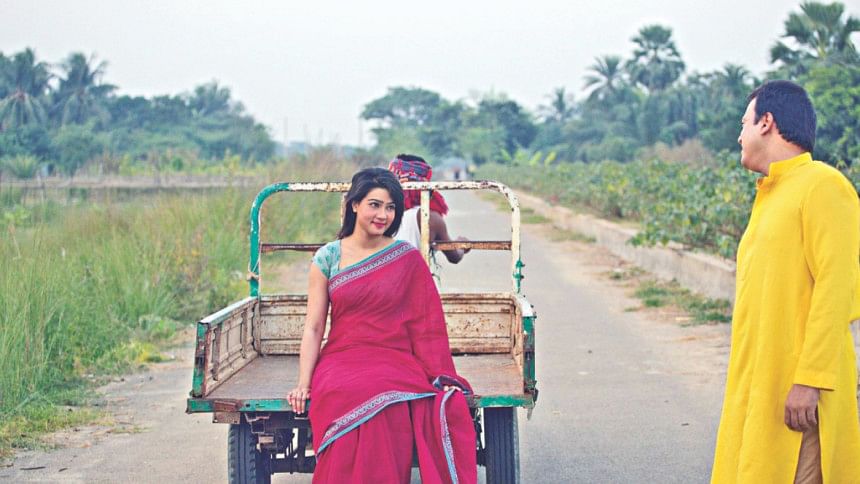A fitting tribute to Humayun Ahmed's storytelling genius

Humayun Ahmed reached unmatched heights as a storyteller in his lifetime, not just with his books but his film adaptations as well. And while his films were taken to the big screen by other directors (starting with “Shongkhoneel Karagar”, “Nondityo Noroke” to this year's “Anil Bagchi'r Ekdin”), they have never been quite at the level of those Humayun directed himself. So when his widow Meher Afroz Shaon took on the challenge of putting “Krishnopokkho”, one of Ahmed's better works, to film, many were curious. The casting choice of Mahiya Mahi in the lead was another decision that turned heads. But the film, released February 26, lives up to Humayun Ahmed's name, despite a sluggish start.
The film revolves around Muhib (Riaz) – the orphaned younger brother of Zeba (Tania Ahmed) who grows up in his sister's house, alongside her cold-hearted husband Shafiq (Azad Abul Kalam) – and Oru (Mahi), the sweet younger daughter of retired police officer who runs a disciplinarian family. Their romance blooms despite the family obstacles and there is a brief moment of conjugal bliss before an accident turns their lives on its head. The tragedy brings out another side of the ever-oppressed Zeba and gives Shafiq a reality check, while Oru goes through the roller-coaster of an arranged marriage proposal, right after secretly marrying her lover.
The film expertly establishes the central characters and the plot quickly, but then the story sort of meanders for a little while, before deep humane emotions take centre-stage in a passage of magnificent visual storytelling, building up to an unforgettable closing shot. A number of Humayun Ahmed's go-to actors feature in a formidable supporting cast – including Ferdous, Faruk Ahmed, Moutushi Biswas, Kayes Chowdhury, Wahida Mollick Jolly, Arfan Ahmed, Rafiqullah Salim, Shadhin Khosru, Tariq Swapan and Joyita Mahalanabish. Of them, Arfan stands out in the role of Muhib's best friend Bozlu, while Ferdous also shines in his cameo. But it is the central cast that makes the movie what it is: Azad Abul Kalam is consistently impeccable; Tania pulls out all the stops in one award-worthy intense exchange; Riaz just sits into his simpleton character, but perhaps the biggest revelation is Mahi. In a role polar opposite to her loud, glamourous ones in commercial films, she makes an incredible effort to tune herself up to the nuances of the quintessential Humayun Ahmed heroine.
Shaon (and her technical team) does a commendable job in terms of achieving a de-glamourised storytelling format with relatable characters and intricate dynamics of human relationships. The cinematography, sound and dialogues are done with care, and the final product turns out to be a heartfelt tribute to Humayun Ahmed's storytelling genius.

 For all latest news, follow The Daily Star's Google News channel.
For all latest news, follow The Daily Star's Google News channel. 



Comments